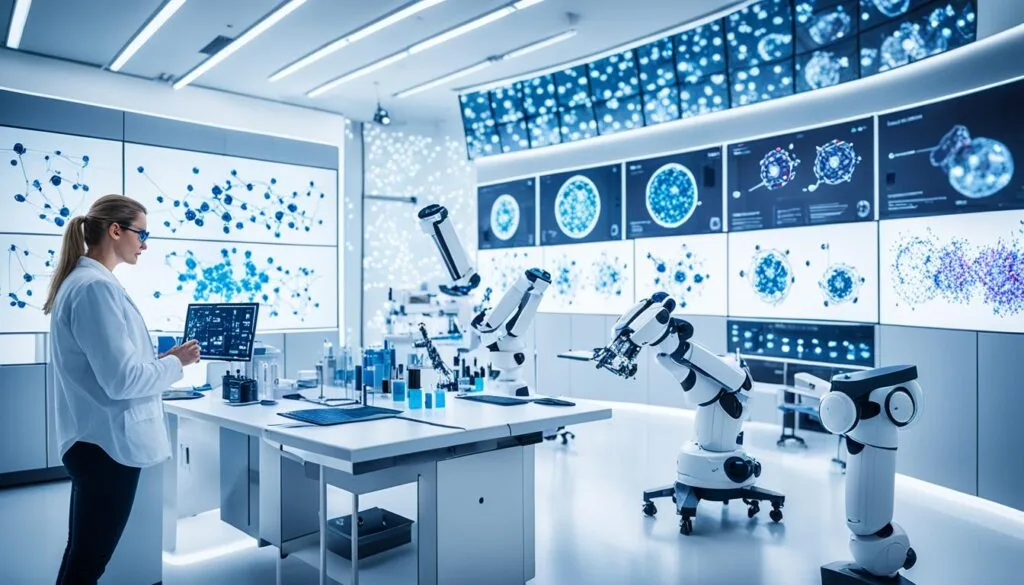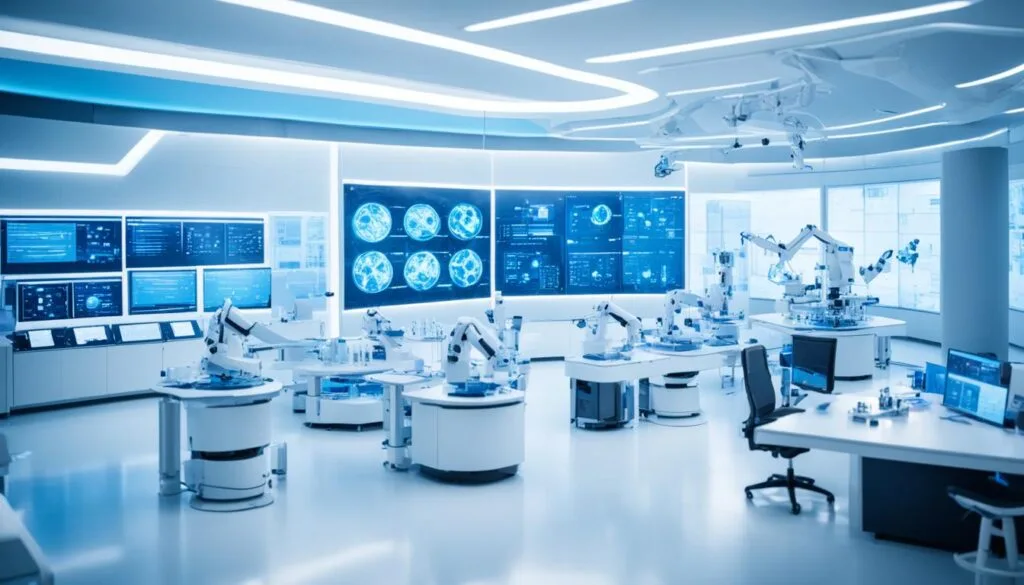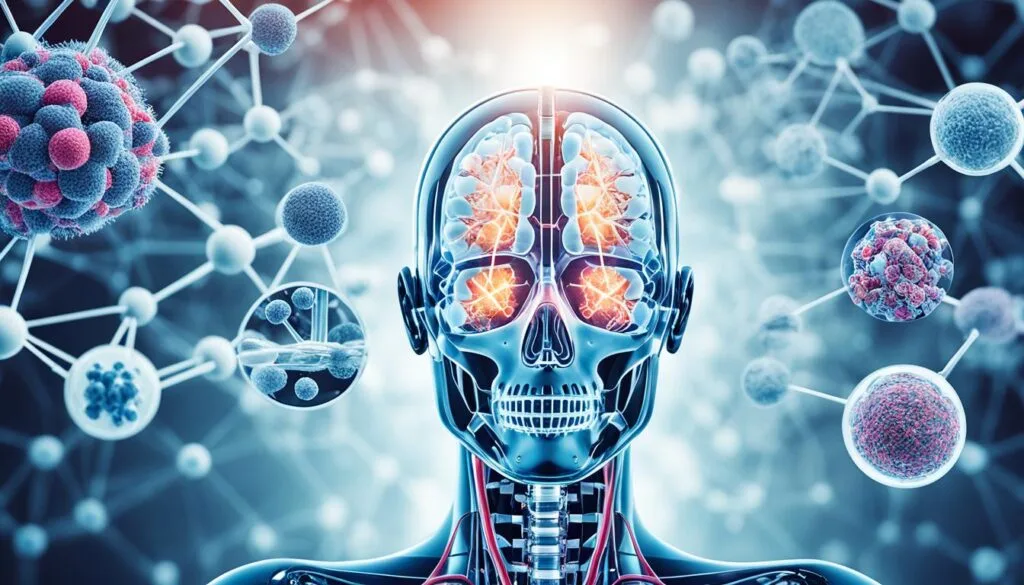
AI’s enduring impact on drug discovery is transforming the field. Finding new medicines is a huge task, needing about $2.6 billion and more than ten years. However, thanks to artificial intelligence (AI), the future of medicine might change a lot. AI could make making new treatments faster and cheaper.
Table of Contents
Key Takeaways
- The drug discovery process is notoriously lengthy and expensive, requiring an estimated $2.6 billion and over a decade of work.
- Advances in AI and machine learning have the potential to revolutionize drug discovery by automating tasks and generating new insights at an unprecedented pace.
- AI-powered techniques like virtual screening and deep learning can improve the prediction of drug efficacy and toxicity, leading to more informed decisions about potential drug candidates.
- Personalized medicine driven by AI can tailor treatments based on individual genetic profiles, improving treatment effectiveness and reducing healthcare costs.
- Collaboration between researchers, pharmaceutical companies, and regulatory bodies is crucial to maximizing the potential of AI in drug discovery and overcoming challenges related to algorithm accuracy and data privacy.
Introduction to AI in Drug Discovery
Artificial intelligence (AI) is changing the way we find new medicines. This technology is making the drug industry more efficient and precise. AI and drug discovery together could make finding new treatments faster and cheaper.
Revolutionizing the Drug Discovery Process
Finding new medicines used to take a lot of time and effort. It was often expensive and not very successful. But now, AI is helping by making things faster and more accurate.
Challenges in Traditional Drug Discovery
The drug industry has had some big problems lately. Things like a drop in how well R&D was working and a slowdown in the US biosimilar market. But, some areas like monoclonal antibodies are doing better. AI is helping to fix these issues by making clinical trials faster and using real-world data to improve treatments.
“AI allows for the more efficient analysis of extensive datasets to identify potential drug candidates, reducing the need for experimental trial and error work and potentially saving research costs.”
Using AI in drug research means we can focus more on what patients need. This leads to faster discovery of new medicines and better health outcomes. As AI gets better, scientists are learning new skills to use it in their work.

Machine Learning and Drug Efficacy Prediction
Machine learning (ML) is a key part of artificial intelligence (AI) that speeds up drug discovery and development. It helps researchers find patterns in huge datasets that humans can’t see. This new way has changed the pharmaceutical industry, making treatments more targeted and effective for patients.
Deep Learning for Drug Activity Prediction
Deep learning (DL) is a top-notch form of ML that’s changing how we predict drug activity. By using DL algorithms on a big dataset of known drugs, researchers can guess how new drugs will work. This makes finding new drugs faster and cheaper than old methods.
Toxicity Prediction and Personalized Medicine
AI does more than just predict how well a drug will work. Machine learning and deep learning are key in spotting bad reactions from mixing drugs, which is vital for personalized medicine. By looking at lots of data, including genes and clinical trials, AI can make treatments that fit each patient better, making them safer and more effective.
| Metric | Value |
|---|---|
| Global business value derived from artificial intelligence | $1.2 trillion (2018), $3.9 trillion (2022) |
| Proportion of research outlays for pharma companies spent on drug trials | Nearly 40% |
| Average time to develop a new therapy | Nearly a decade and a half |
Using machine learning for drug discovery and deep learning in pharmaceuticals has changed how we make drugs. It leads to better and more tailored treatments. As AI-driven drug repurposing grows, the future of medicine looks bright, promising big improvements in patient care and changing healthcare for the better.

Virtual Screening: AI-Driven Lead Identification
AI-driven drug discovery has made virtual screening a key method for finding new lead compounds. This method lets scientists check millions of compounds against proteins quickly. It uses two main ways: ligand-based virtual screening (LBVS) and structure-based virtual screening (SBVS).
Ligand-Based Virtual Screening
Ligand-based virtual screening (LBVS) uses biological data to spot active compounds. It looks at the structure and chemical makeup of active and inactive molecules. This helps predict if a compound might work well. It’s useful when the protein’s 3D structure isn’t known.
Structure-Based Virtual Screening
Structure-based virtual screening (SBVS) needs the 3D structure of the target protein. It puts millions of compounds into the protein’s binding site to see how well they fit. This method finds new compounds that could be good leads.
After finding promising compounds, they are tested in the lab. This speeds up finding drugs with the right effects. AI makes virtual screening key in finding new drugs, saving time and money.
| Ligand-Based Virtual Screening (LBVS) | Structure-Based Virtual Screening (SBVS) |
|---|---|
| Analyzes the structural and physicochemical properties of known active and inactive molecules to predict compound activity. | Computationally docks millions of small-molecule compounds into the binding site of the target protein to evaluate binding affinity and potential to modulate protein function. |
| Useful when the target protein’s 3D structure is not available. | Requires knowledge of the 3D structure of the target protein. |
| Relies on molecular fingerprints and structural similarities. | Enables the identification of novel chemical scaffolds as potential lead compounds. |
AI’s Enduring Impact on Drug Discovery
The pharmaceutical industry has seen a big change with AI and machine learning. These technologies have brought a new level of efficiency and innovation to finding new drugs. They help solve old problems and speed up the search for promising drug candidates.
One big step forward is the SPARROW algorithm from MIT researchers. SPARROW helps find the best molecules for new drugs, as seen in a Nature Computational Science study. It can look at hundreds of molecules at once, using different types of molecular structures. This has changed how researchers find new drugs.
| Key Achievements of SPARROW | Impact on Drug Discovery |
|---|---|
| Batch synthesis of molecules | Enables efficient handling of numerous potential drug candidates |
| Incorporation of diverse molecular sources | Leverages human-designed molecules, virtual catalogs, and AI-generated molecules |
| Identification of cost-effective synthesis plans and common experimental steps | Streamlines the drug discovery process and reduces overall costs |
AI’s impact goes beyond SPARROW, affecting the whole pharmaceutical industry. Companies using AI and machine learning are on track to create over 50 new therapies in 10 years. This could open a $50 billion market.
AI-driven drug discovery could also lead to 15% more approved therapies than in 2021. This shows how big AI’s role is in the future of medicine. It’s making drug development cheaper and faster.
“AI tools are being used by companies like Bayer, Roche, and Pfizer to accelerate the drug discovery process and reduce costs by predicting drug properties and analyzing large datasets for new compounds.”
The future of drug discovery looks bright as the pharmaceutical industry uses AI and machine learning more. These technologies help researchers and companies work more efficiently. They aim to bring life-saving treatments to patients faster.
Enhancing Drug Discovery with Data Analytics
Data analytics and machine learning are changing the game in drug discovery. They help scientists find insights hidden in Big Data. This is a big deal in the pharmaceutical world.
Analyzing Large Datasets with Machine Learning
Machine learning is key in drug development. It helps researchers find patterns in huge datasets. This could lead to new drugs.
By looking at genetic info, research papers, and clinical trials, machine learning finds things humans can’t. This leads to better treatments for patients.
Dr. Zev Wisotsky is a big name in using cloud-based software to speed up research. He helps biotech and pharmaceutical companies work faster and more efficiently.
“Collaboration between scientists and technology is crucial for curating and interpreting complex datasets effectively in drug discovery.”
The drug industry faces big challenges in finding new treatments. Data analytics and machine learning can help a lot. They make the process faster and more innovative.
By using data and technology together, researchers can make big strides in finding new treatments. This means better health outcomes for patients.
The future of finding new drugs is all about combining data analytics and machine learning. This approach helps researchers deal with Big Data and find the next big breakthroughs.
AI and the Future of Personalized Medicine
The rise of ai-enabled personalized medicine is changing healthcare. It’s making treatments fit each patient better. By using AI and looking at a patient’s genetic data in drug discovery, doctors can predict how a treatment will work for someone. This leads to better treatment results and fewer side effects.
This personalized way looks at a patient’s genes to find the best treatment. AI checks a patient’s genetic info against big datasets to pick the right drugs and amounts. This makes treatments work better and cuts down on side effects seen in old methods.
ai-enabled personalized medicine could change the drug industry too. It makes making new drugs faster and cheaper. By simulating how drugs work and predicting patient reactions, companies can speed up drug development. This means new medicines come out quicker and cost less.
As genetic data in drug discovery grows, AI will play a bigger role in healthcare. This will change how we give treatments, making sure patients get the best care possible.
“The future of medicine lies in the personalization of treatments, and AI is the key to unlocking this transformative potential.”
| Key Benefits of AI-Enabled Personalized Medicine | Challenges Addressed |
|---|---|
| Improved treatment efficacy Reduced risk of adverse reactions Optimized drug development process Cost-effective healthcare solutions | Individual genetic variations Limitations of traditional one-size-fits-all approaches Inefficiencies in drug discovery and clinical trials Rising healthcare costs |
Ethical Considerations in AI Drug Discovery
The pharmaceutical industry is using Artificial Intelligence (AI) to change how we find new drugs. This brings both good things and tough ethical questions. AI helps process huge amounts of data fast, making it better at predicting how drugs will work and designing new ones. But, we must think about privacy and bias issues.
Data Privacy and Bias Concerns
Using AI in drug development means handling a lot of patient data. It’s important for researchers, companies, and regulators to keep patient info safe. They must make sure people’s right to privacy is respected. Also, AI’s bias must be checked to prevent unfairness in who gets new treatments.
- Ensuring the integrity and security of patient data throughout the drug discovery process
- Developing transparent and accountable AI systems to mitigate the risks of algorithmic bias
- Establishing robust ethical frameworks to guide the responsible use of AI in pharmaceutical research
As AI in drug discovery grows, focusing on ethics is key. By tackling these issues, the industry can use AI’s power without losing sight of privacy, fairness, and responsibility.
“The ethical implementation of AI in drug discovery is not just a moral imperative, but a critical factor in ensuring the long-term sustainability and public trust in this transformative technology.”
Overcoming Challenges in AI Drug Discovery
AI has changed the way we find new drugs, but it also brings challenges. One big issue is getting access to lots of good data. This is hard because of worries about keeping data safe and how research is done in separate parts. Working together is key to get past these problems and use data right.
Another challenge is AI might not always help the drug-making process. It can speed up some tasks like planning clinical trials and making documents. But, relying too much on AI could harm the human skills needed for finding new drugs. Finding the right mix of AI and human work is important to use these tools well.
To make the most of AI in making drugs, we need to look at it from many angles. We should keep improving AI and teach drug experts more. Working together between researchers, companies, and groups that make rules can also help use AI right in finding new drugs.
- Working together is key to get past problems with data access and management.
- Finding the right balance between AI and human work is important for keeping the drug-making process honest.
- Improving AI and teaching drug experts will help solve AI’s limits in making drugs.
The drug industry is really taking to AI’s potential, but we must get past these hurdles to see the big benefits. By tackling AI’s limits, we can open new doors in healthcare and change how we make treatments.
Conclusion
Artificial intelligence (AI) is changing the way we find new drugs. This change is good news for both the pharmaceutical industry and patients. AI has made finding new drugs faster and cheaper.
Now, AI-designed drugs are being tested in clinical trials. The FDA has also recognized AI-discovered drugs. This shows how powerful AI is in drug development.
AI can predict the structures of millions of proteins. This is a big deal for pharmaceutical research. It means we can make new discoveries faster.
Even though there are still challenges, the collaboration between industries and universities is helping. This teamwork is pushing AI in drug discovery forward. We can look forward to better treatments and more efficient healthcare thanks to AI.
FAQ
What is the potential of AI in revolutionizing the drug discovery process?
AI can automate tasks and find new insights quickly. This lets researchers find potential drug candidates faster than before.
How does machine learning contribute to drug development?
Machine learning looks through huge datasets for patterns and trends. It finds insights that humans might miss. This helps in discovering new drugs.
What is the role of virtual screening in AI-driven drug discovery?
Virtual screening is key in AI-driven drug discovery. It lets researchers check millions of compounds against proteins. This speeds up finding promising drug candidates.
How is AI enabling personalized medicine?
AI is moving towards personalized medicine. It matches treatments to a patient’s genes and other factors. AI uses genetic data to find the best treatments and predict drug responses.
What are the challenges associated with the use of AI in drug discovery?
There are issues with data access and ethics. AI could affect drug discovery and processing. It’s important to make AI algorithms accurate and address data privacy and bias concerns.
